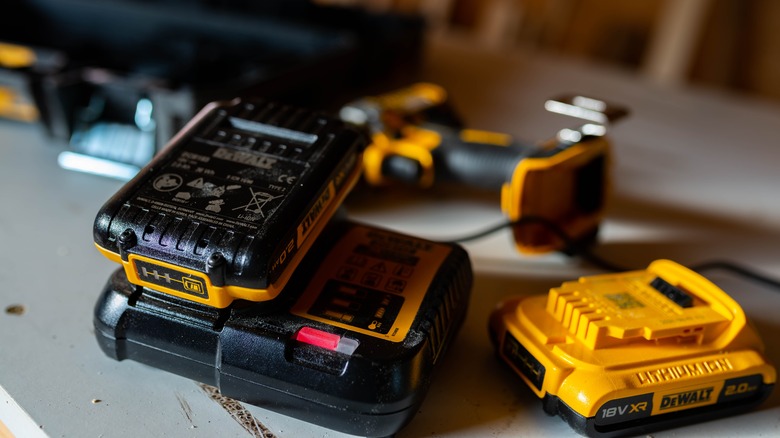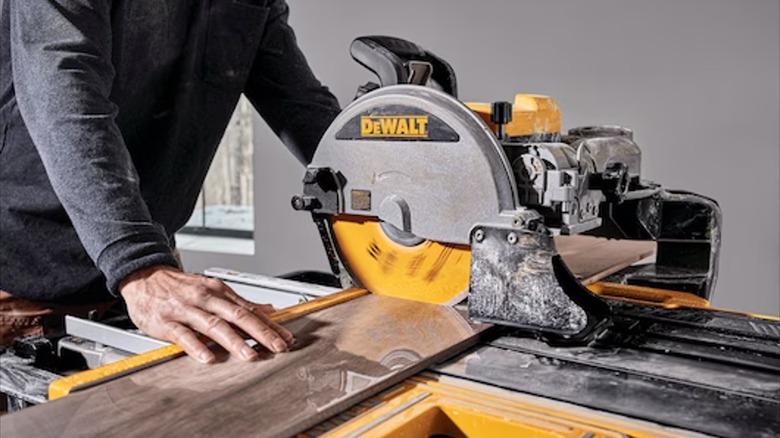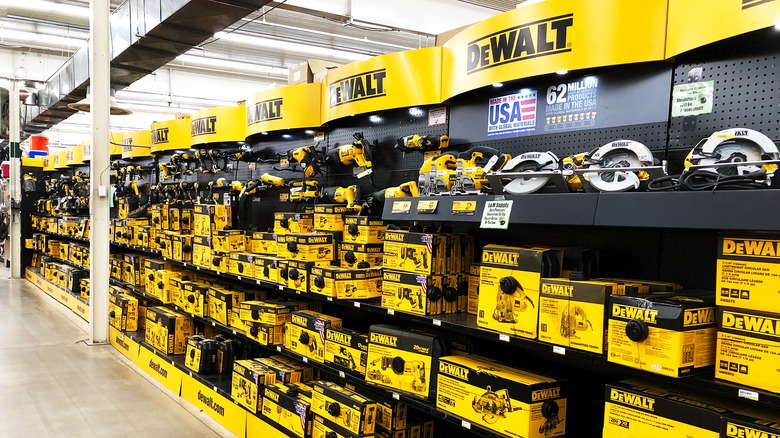Can DeWalt Tools And Batteries Be Used If They Get Wet?
While throughout the years, DeWalt has introduced a slew of non-power tools that deserve a second look, like portable workbenches, heavy-duty clamps, and even a music player/radio that can hold up pretty well in rugged environments, power tools remain its core products. Unfortunately, DeWalt's power tools and batteries can be a little more fragile than you might like, especially when it comes to liquid exposure. Indeed, DeWalt's support team confirms that most of their power tools, whether corded or cordless, are unusable once wet. In addition, it claims that using your power tools in wet conditions can lead to disastrous consequences, such as injury, shock, or damage to your surroundings. Or worse, you could get yourself killed.
DeWalt recommends not exposing your batteries to liquids, like oil and water, as well as extreme temperatures. So, while you can get away with a few stray droplets, long-term exposure to wet conditions can cause problems. For its Li-On Vehicle Charger manual, DeWalt also specifically warns against immersing it in liquid, as well as using its battery charger in marine environments, due to the corrosive qualities of saltwater.
The one DeWalt power tool you can get wet
However, DeWalt does share one power tool line rated for exposure to water; tile saws. This is because with these tools water acts as a critical component in the cutting process, both cooling and lubricating the blade. That being said, it's limited to certain products, like the 10" Wet Tile Saw With Stand, 10" High Capacity Wet Tile Saw (pictured), and 10" Heavy Duty Wet Tile Saw.
However, it's worth noting that even if a power tool is marketed for wet use, it doesn't mean you should be leaving it outdoors during a storm, using a power washer to clean it, or exposing your tool's plug contact points to water. For example, the instructions for the DeWalt 10" (254 mm) High Capacity Wet Tile Saw state that while it can be wet for its intended use of cutting tiles, it should not be used in wet conditions. It even has special instructions to use drip loops and to disconnect the fuse after use, instead of simply unplugging a wet plug.
On other hand, if there are any issues with your battery, DeWalt cautions to avoid repairing or servicing it yourself. In doing so, it's possible that you may invalidate its warranty for replacement or repairs. Instead, it recommends sending it over to a DeWalt Service Center for evaluation.
How to take care of your DeWalt Tools
While not all of Dewalt's products are made in the USA, the brand still has a decent reputation for durability. However, the actual longevity of any power tool also depends on how well you take care of it. As with any type of power tool, using a regular cleaning and maintenance schedule, as well as proper storage practices, can prevent a host of issues, not just water damage.
In general, it's always recommended to avoid leaving your tools at the mercy of the elements, such as extreme temperatures or weather. When possible, you should always check the manual for your power tool for specific instructions regarding its capabilities and care, as it will affect whether DeWalt will cover any damages under its warranty. Thankfully, most of these are available online through the DeWalt website.
Lastly, it's important that you make sure your DeWalt tools are legitimate to avoid any damages from supposedly normal use. While DeWalt isn't like other power tool brands that have exclusive partnerships with some retailers, it doesn't mean you can find guaranteed authentic products everywhere. So, if you bought your DeWalt power tool on Amazon, which isn't an authorized retailer, you should bear in mind the possible risks involved. While DeWalt does have a few strange tools, you can spot a real one from a fake by checking its photos on official channels and comparing how it looks in-person.


